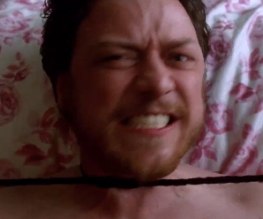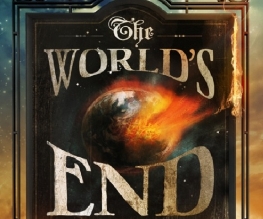Junkhearts

Junkhearts, the directorial debut from Tinge Krishnan, is a fine effort; but it’s wildly depressing, there’s no doubt about it. In fact, despite the touches of black humour buried along the way, like nuggets of gold hidden in the silty riverbank, this film should probably come with an emotional health hazard:
WARNING: MAY CAUSE SHORT-TERM MISERY AND DESPAIR.
Although the film follows three threads, our main protagonist is Frank (Marsan), a lonely 50-something man who he spends most of his day sitting in an armchair, sipping at an evil-smelling drink in order to stem the nightmarish hallucinogenic flashbacks which invade his living room. The only time Frank ever leaves the house is to navigate the pavements between his flat and the local shop in order to stock up on fags and booze. On one such occasion he comes across to Lynette (Reid), a runaway sleeping on the streets. Distressed, acerbic and bitter, she lets loose at Frank when he stands by and watches a drunken socialite offer Lynette twenty quid to “suck my balls”.

The next day, Frank heads back and finds himself firstly buying Lynette’s lunch, then a sleeping bag and, eventually, offering her a place to stay. After a frosty start, the pair form a genuinely warming friendship, with the two actors bouncing the loaded and witty dialogue back and forth between them with as much ease and dexterity as two ping-pong superstars at the world championships.
Meanwhile, amidst scenes of Lynette and Frank forming a tentative father-daughter style relationship, we’re treated to titbits from the life of businesswoman Christine (Garai), who, despite her good looks and high-flying job, struggles to deal with life as a single mother. Unable to cope with the constant hopelessness of her situation, she turns to drugs in order to fill the gaping voids in her life. The fact that she ends up in bed with the “suck my balls” socialite, who tosses the same money he offered Lynette down on the bed as he leaves, seems to establish that, despite her higher social standing, she is just as vulnerable as any girl on the streets…

Loneliness is perhaps the most powerful drug in the film; all three central characters turn to substance abuse as a means of escape from their unhappiness. This striking British film showcases an excellent cast, all of whom tackle their weighty subject matter in an unnervingly believable manner. Marsan makes an oddly likeable anti-hero, whilst Sturridge and Reid really prove their worth as excellent young actors; you find yourself simultaneously loathing and loving their characters the entire way through.
My one nagging point is that the film’s conclusion seemed too abruptly optimistic and out of sync with the rest of the plot, yet this does nothing to mar the viewing experience; despite the dull grey locations, there is something wildly beautiful about the ugliness of inner-city London. The stark cinematography forces a constant sense of unease; in fact, it is with some trepidation that we watch Frank lead Lynette back to his flat. The drawn-out shots of the key turning in the lock, the closing elevator doors and well-prepared spare bedroom make us feel as if Lynette is entering the home of someone with malicious intentions, although, ironically, it becomes apparent that Frank is the less dangerous of the two.

You can walk out of the cinema but you can never walk away from Junkhearts . It gets in your head; thet pressing urgency and quiet desperation which you feel so prominently throughout the entirety of the film will grow louder and louder in your ears until it’s all you can hear. Sure, it’s depressing as hell, but it’s worth the effects in the long run. Independent British drama at its best.





Recent Comments